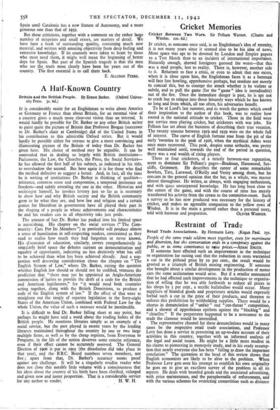A Half-Known Country
Britain sad the British People. By Ernest Barker. (Oxford Univer- sity Press. 3s. 6d.) IT is considerably easier for an Englishman to write about America or Germany or France than about Britain, for an external view of a country gives a much more clear-cut vision than an internal. It would hardly be possible for Dr. Barker or any other British writer to paint quite the picture of Britain that Professor Brogan (successor to Dr. Barker's chair at Cambridge) did of the United States in his contribution to this admirable Oxford series. But it would hardly be possible either for anyone to give a more convincing and illuminating picture of the Britain of today than Dr. Barker has given here. His choice of method may be arguable. It can be contended that in dealing so largely with British institutions— Parliament, the Law, the Churches, the Press, the Social Services— he has allowed the first half of his subject, as indicated in his title, to overshadow the second. But here again it is for those who find the method defective to suggest a better. And, in fact, all the time he is writing of institutions Dr. Barker is thinking of qualities— tolerance, common sense and compromise, a tempered insistence on freedom—and subtly revealing the one in the other. Historian and sociologist himself, he invokes history just so far as is necessary to show how and why British society and the British community grew to be what they are, and how law and religion and a certain genius for liberalism in government have all played their part in the shaping of a people in whose achievements and characteristics he and his readers can in all objectivity take just pride.
The amount of fact Dr. Barker has packed into his limited space is astonishing. His chapter on the social services (" The Com- munity: Care For Its Members ") in particular will produce almost a sense of humiliation in self-respecting readers, constrained as they read to realise how much they had forgotten or never known. His discussion of education, similarly, covers comprehensively in singularly brief space the debates current on democratisation and equality of opportunity, indicating no less decisively what has still to be achieved than what has been achieved already. And a sug- gestion well deserving consideration closes the chapter on "The English System of Law," where Dr. Barker, raising the question whether English law should or should not be codified, ventures the prediction that "there may yet be appointed an Anglo-American commission or jurists to provide the draft of a code for the British and American legislatures," for "it would need both countries acting together, along with the British Dominions, to produce a code of the English system of law." If the effect of that were to straighten out the tangle of separate legislation in the forty-eight States of the American Union, combined with Federal Law for the whole Union, the value of such a measure would be inestimable.
It is difficult to find Dr. Barker falling short at any point, but perhaps he might have said a word about the reading habits of the British people. He mentions libraries simply as an example of a social service, but the part played in recent years by the lending libraries maintained throughout the country by one or two large multiple firms, as well as by the cheap reprints, from Everyman to Penguins, in the life of the nation deserves some concise reference, even if their effect cannot be accurately assessed. The General Election of 1906 is put in 1905 (the dissolution did take place in that year), and the B.B.C. Board numbers seven members, not five ; apart from that, Dr. Barker's accuracy seems proof against any challenge. It will be a singularly erudite reader who does not close this notable little volume with a consciousness that his ideas about the country of his birth have been clarified, enlarged and given new and juster proportion. That is a considerable service


























 Previous page
Previous page